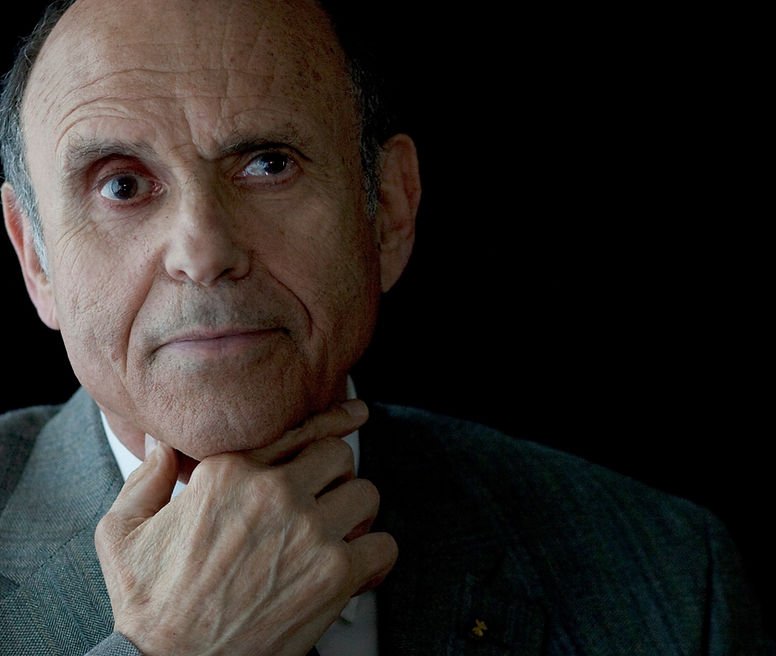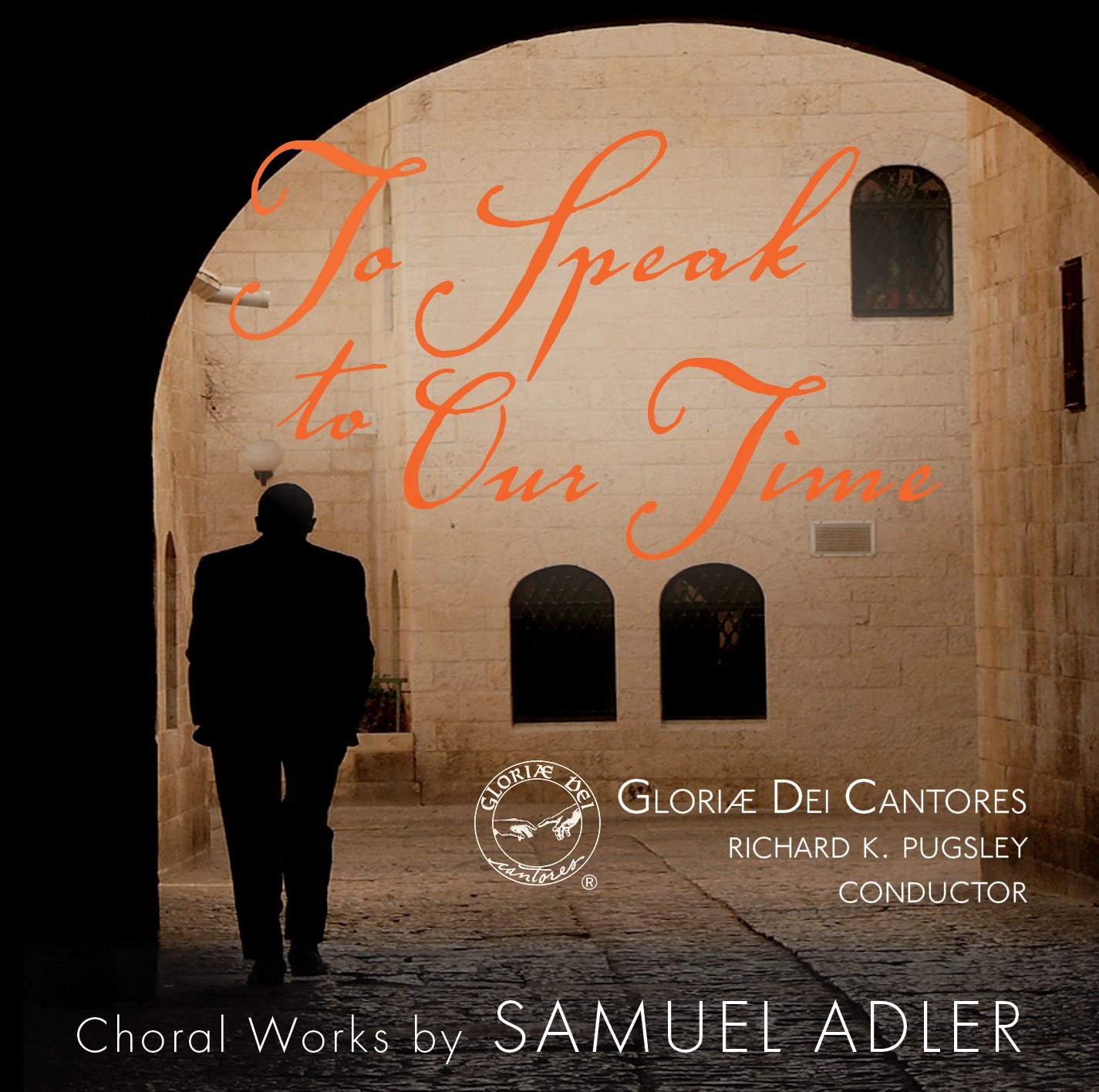Samuel Adler
Photo © 2017 Samuel Adler
I have always longed for a new recording of some older choral works plus brand new ones which have never been recorded. Since Gloriæ Dei Cantores has issued an entire CD of my Sacred Choral Music under the title of A PROPHECY OF PEACE and quite a few Psalm settings on other CDs with Elizabeth Patterson, conducting, I approached Richard Pugsley and asked him if he would be interested in doing a project of recording some of the newer works plus some non yet recorded older scores. After sending him the score of TO SPEAK TO OUR TIME he immediately responded that he would be delighted to record this work plus a series of unrecorded other choral scores.
When I received the complete unedited mp3 file of the entire CD, I was overwhelmed by the excellence of the recording of each and every one of the works and thought they needed very little if any editing. Rick with his excellent ear and his precise knowledge of each piece made the performances perfect as they are on this recording.
All the works on the recording are ‘first recordings’ and only one is an arrangement, and that is a setting of ‘Amazing Grace’ which I call ‘How sweet the Sound.’ It was commissioned by the publisher Carl Fischer. The head of the publishing firm said that they needed an arrangement of this beautiful melody in the style of Aaron Copland since the choral music by this great American composer is one of their competing publishers’ best sellers, and since I was one of Copland’s students I should be able to approximate his style. I tried to satisfy their wishes and I have to say that after Copland heard my arrangement he called me and congratulated me on it, however never mentioning anything about the style, which made me happy.
Gloriæ Dei Cantores
My association with Gloriæ Dei Cantores goes back quite some time and began when they wanted to give awards to three composers for their contribution to sacred music in America. They were Daniel Pinkham, Robert Starer and myself. The three of us were invited to Orleans for a concert of our music and an awards ceremony. Dan and I attended, but Robert Starer was already too ill to be there. I must say that it was ‘love at first sight’ for me. My music was performed beautifully and I struck up a friendship with Elizabeth Patterson and three organists who had been students at the Eastman School of Music during my tenure there, and it was a pleasure to renew my acquaintance with them at that time.
To me this relationship for so many years has been one of the most satisfying musical relationships any composer could wish for. The work “My Beloved is Mine” was written for an anniversary of GDC and dedicated to Elizabeth Patterson. Several choral conductors after listening to my Second Piano Concerto thought that the theme of the slow movement would make a romantic tune for a choral piece. I agreed and thought it right for a work based on the famous text from the Song of Songs and a fitting tribute for the founder of GDC.
My father, Hugo Adler, was a Cantor and a composer of sacred music and a lover of choral music of all religious faiths. I grew up in a house where that music was always a topic and listened to constantly. I fell in love with Jewish chant, Gregorian chant, Anglican and Lutheran chant and actually took courses in these subjects in college. My father believed in the idea that there are many paths to God and that one should know as much Synagogue as well as Church music as possible if one wants to write sacred choral music. It is from his ideas that I have always tried to emulate my own output of sacred music.
As far as style is concerned, I must say that my style has changed in the many years I have been composing. I had the privilege of studying with some of the greatest composers of the 20th century - Aaron Copland, Walter Piston, Paul Hindemith, and Randall Thompson, as well as a composer who I consider one of the great synagogue composers of that century, Herbert Fromm. At first, especially after my student days, I was very much influenced by these great men. This can easily be seen in my early symphonies as well as in my early choral music, especially the cantata THE VISION OF ISAIAH. Then there came a period of rebellion when I experimented with 12 tone music as well as improvisatory elements and many others, and finally I came to the conclusion to write the music I hear above all and the music I truly love. I think after more than 450 works I have not found one overriding style, but an expression which is ‘me’.
Now as to the title work of this CD: TO SPEAK TO OUR TIME. As a child I lived through the terrible events of Kristallnacht, November 9-10, 1938. It was a frightful event for my family as well as for me. It was the beginning of what we now know as the Holocaust. Our family was fortunate that soon thereafter we were able to emigrate to the United States, however the frightful feelings of that day have remained with me to this day.
When in 2018 for the 80th anniversary of the event, the conductor Hans-Christoph Rademann commissioned me to write a work for the Dresden Chamber Choir to commemorate this anniversary, I decided to write a work in four languages to emphasize the unity of all humankind by using the languages of the three major Western faiths. The first is a poem by the Nobel Prize winning poet of the Holocaust, Nelly Sachs, which is as meaningful today as it was during the Second World War. It speaks of the horrors of homelessness and despair and a plea to all peoples to try to relieve the misery still too prominent in our world. “They knock at the doors and the doors are all closed to them.”
Then I want to lead our world to look at our faiths for the assurance that a better world can be created if we look at our faiths and follow the dictum: What does the Lord require of you: ‘Only to do Justice to love mercy and walk humbly.’ I added Psalm 121 in Hebrew, parts of the 111th Psalm in Latin, and a paraphrase of the 60th Chapter of Isaiah by the British poet Cowper who was a poet of several poems for the Protestant church. It is my hope that some of this music may indeed speak peace and healing to our troubled time.
— Samuel Adler
CLICK THE ALBUM COVER TO PREVIEW THE RECORDING, AND CLICK HERE TO LISTEN ON APPLE MUSIC, SPOTIFY, AND MORE!


